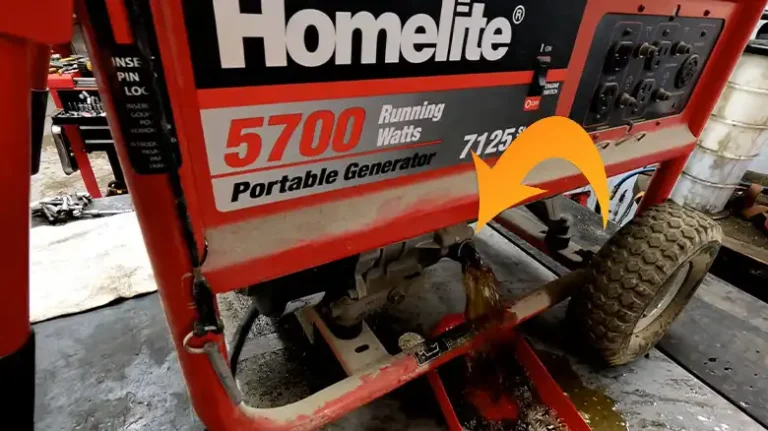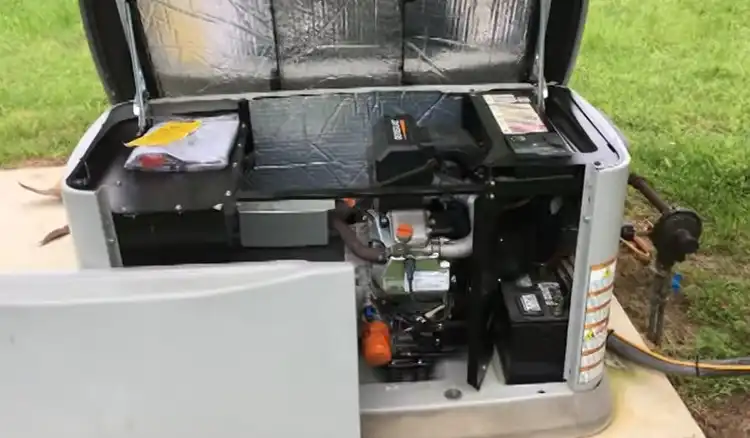What Does Overcrank Mean on a Generator? Everything You Need to Know
Overcranking happens typically when you try to start up your generator, especially after a long time. The engine cranks up or coughs but doesn’t start. Then you receive overcrank error code. So what does overcrank mean on a generator?
Well, it means that the generator engine is trying to crank, and the ignition coil is sending a good cranking signal, but the engine is not actually starting. Most of the time, it is something that’s directly related to fuel and other maintenance issues.
So, if your generator overcranks from time to time, continue reading below to find out more about what causes overcranking on a generator and how to fix it.

What’s Overcrank on Generators?
When a machine’s engine is cranked, meaning it turned or wound over, but it doesn’t start, it’s called overcranking. Continued cranking is bad for the engine, be it your car or your generator’s engine. Because it creates excess heat, and that creates a heavy load on the starting circuit.
While cranking is a normal process of your engine startup, over-cranking is not. So, when your generator shows overcrank code, it’s best not to crank anymore before looking into the issue.
So, let’s see what causes overcrank so you know how to get rid of it.
What Causes Overcrank in Generators?
As we stated earlier, overcrank occurs mostly because of fuel and maintenance-related problems. With that in mind, let’s take a deeper look into specifics.
1. Ignition System
The spark plug, ignition coil, coil fuse, etc. falls under this category. They sort of go hand in hand. The spark plug creates the spark to ignite the fuel and air mixture. The ignition coil, on the other hand, generates the high voltage that the spark plug needs to create that spark. So as you can see, any issues with these can prevent your generator from starting, causing over-crank.
2. Low Voltage
Now this goes without saying that when your battery voltage is low, it will fail to start the engine repeatedly, leading to overcrank. So, if you already own a weak battery, or you haven’t used it for long, it’s possible that the battery is discharged to the point that it no longer can start the generator.
3. Fuel and Oil Related Issues
There are a lot of things that can go wrong here. For starters, if your oil level is low, or the quality has deteriorated, it can cause your generator to overcrank. Yes, even a little under the required oil level can cause this.
In the case of fuel, if the fuel level is too low, the fuel filter is all clogged up, or even if it’s gone stale, it can cause overcranking. Also, check if the fuel supply pipe has clogged.
4. Dirty Air Filter
If the air filter has clogged up to the point that it no longer can pass air through it, it’ll cause overcrank. In fact, restricted airflow is one of the major reasons for an overcranking generator engine.
3. Other Mechanical Issues
Last but not least, there is a lot of wiring inside a generator. Any faulty wiring, solenoid, or even the engine can be the cause of overcranking.
How to Fix Overcranking on a Generator
So, now you know what causes a generator to overcrank. With all that in mind, let’s take a look at how to fix a generator that’s been over-cranking.
1. Check the Starter Motor
The starter motor is what’s responsible for cranking up the engine when you start your generator. To check the starter motor, check for any signs of damage. Also, check for any loose cable or wire and tear on the starter motor. If you notice anything, replace it immediately.
2. Charge the Battery
First of all, check the battery with a multimeter. If you did, and found that the battery voltage is low, use a battery charger to charge it from a wall outlet. Take extra care to keep the battery terminals clean and tight when charging.
3. Clean the Air Filters
Even if the air filter may not seem that dirty to you when you’ve opened it up for inspection, clean it. Use lukewarm water with mild soap to clean it then dry it up. Rinse it with a bit of oil before fitting it in again.
4. Clean the Plugs
Remove your spark plug and give it a good inspection. If you see any sign of wear, it’s best to replace it. However, if you don’t have a spare one handy, you can use a hard-wire brush to clean your spark plugs. Give it a proper cleaning and reinstall it. A clean spark is a must if you want to stop your generator from overcranking.
5. Replace or Refill the Oil
If the oil level is low even a little, refill it. However, if you can’t remember when the last time you changed your generator’s engine oil, it’s probably time to replace it. Dirty oil clogs up the carburetor, causing over-cranking.
6. Replace the Gas
Gas goes bad, sooner than you’d expect. So, if you’ve used your generator for more than a few months, it’s possible that the gas has gone stale. Drain the entire fuel system and refill it with fresh new fuel.
7. Reset the Controller
For generators like the Generac that come with digital controller displays, when you see the overcrank error code, reset the controller and then restart your generator. This often does the trick.
8. Seek Professional Help
We’ve mentioned earlier that overcranking can damage your generator, leading to premature engine failure. So, when you’ve tried everything but your generator is still showing the overcranking error code or signal LED, don’t force it to start anymore. Rather, contact a professional to come and take a look at it.
How to Keep Generators From Overcranking
It is important to learn how to maintain your generator properly so that you can keep it from overcranking in the future.
1. Do Routine Maintenance Regularly
We’ve already mentioned that over-cranking is the result of improper or no maintenance. So do routine maintenance of your generator from time to time. This includes checking the oil and fuel, battery, filters, plugs, etc.
2. Use Quality Fuel
While you can’t do much about the quality of the fuel you get from your local gas station, you can certainly make sure that you always use fresh fuel.
3. Warm it Up Sometimes
When not using it for months at a time, start your generator and leave it on for a couple of minutes every once in a while. This will keep it from discharging and overcranking.
4. Store it Properly
When storing your generator, drain out the fuel completely and disconnect the battery if you can. A properly stored generator seldom overcranks.
Frequently Asked Questions and Answers (FAQs)
What causes overspeed on Generac?
If you detect an Overspeed code on your generator, it indicates that the ignition coils are defective or faulty. Get it replaced by a professional immediately.
What is the maximum speed of a generator?
Typically in the US, a 2-pole generator runs at 3600 RPM while the 4-pole ones run at 1800 RPM.
Can I run my generator for 24 hours?
Yes, properly maintained generators can run for weeks at a time.
Conclusion
In short, over-crank occurs when the controller detects the RPM is higher than required. So, it prevents your generator from starting, to prevent any engine damage. Doing thorough maintenance gets rid of it most of the time.
Remember to perform regular maintenance so that your generator doesn’t over-crank in the time of need, which usually is in an emergency situation. Good luck and thanks for reading.



![[100% Working] Champion Generator Electric Start Not Working](https://generatorwheel.com/wp-content/uploads/2023/03/Champion-Generator-Electric-Start-Not-Working-768x431.webp)

![[Easy Steps to Follow] How to Prime a Generator?](https://generatorwheel.com/wp-content/uploads/2023/03/How-to-Prime-a-Generator-768x431.webp)